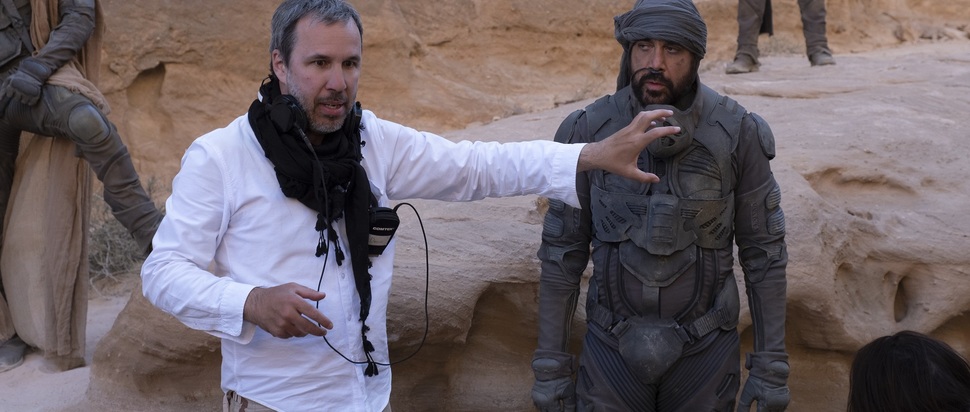Denis Villeneuve Wants You to Think Big
Ahead of Dune arriving in cinemas, we look back at Denis Villeneuve's recent run of blockbusters to gauge if he has what it takes to bring Frank Herbert's epic sci-fi novel to the screen
Too often in genre filmmaking, the human component is forgotten. When watching big, bombastic films, we’re used to underdeveloped characters crumbling and slipping away entirely under the blockbuster spectacle. This is never a problem with the Hollywood movies of Canadian director Denis Villeneuve.
Before helming the monstrous Dune, Villeneuve’s projects had been getting progressively bigger in scale and scope. But in each, a crucial narrative rule was inscribed. The vast, expansive nature of the story was always rooted in a lone protagonist’s point of view, so the audience feels the weight of confronting a new world along with the character. In other words, we don’t simply gawk at the blockbuster thrills in a Villeneuve joint: we experience them ourselves.
In the triple-punch of Sicario (2015), Arrival (2016) and Blade Runner 2049 (2017), we follow skilled and experienced protagonists as they're forced to recalibrate their understanding of the world by facing something previously unimaginable. These characters – an FBI agent, a linguist and a (robot) detective – have rigid expectations of how to act when faced with a crisis, but as they step into the unknown, they question how much good their training will do them. The films ask: Can facing a towering new world force us to change and grow?
Sicario
In the drug thriller Sicario, federal agent Kate (Emily Blunt) is brought on to an unorthodox taskforce to hunt down key figures in a Mexican cartel. The brutal and unflinching way her superiors deal out justice has Kate tearing herself apart over her ethics in the field. Throughout the film, Villeneuve fosters a feeling of disorientation; you get the sense that, like Kate, the important information is being kept out of your reach. Of these three films' protagonists, Kate certainly has the least agency, but she always fights to make the moral choice down to her final submission that, in the hellish war she’s neck-deep in, such efforts are pointless. The fact that she can’t shake her preconceived notions of how justice should work means she’s forever out of place, something that ultimately saves her soul as others wade deeper into moral degradation.
Arrival
Villeneuve’s follow-up, Arrival, sees a character undergo a similar journey – albeit a much more humanist one. Louise (Amy Adams) is an accomplished linguist who’s brought in by the military to decipher the language of aliens who have just touched down at random points across the planet. What sets her apart from her military colleagues is how willing she is to adapt to her surroundings – soon, it’s the authorities that are catching up with Louise, rather than her lagging behind.
The scope of Arrival’s story encompasses the whole planet, but even as the geopolitical stakes are raised, Louise always remains the focal point of the narrative. By learning the aliens’ language, the way she thinks will literally change. In less deft hands, this would be a difficult concept to express to an audience, but with an emotional foundation to Louise's character – and a nifty bit of misdirection – the seismic, brain-altering impact these aliens will have on humanity is beautifully realised. It's Louise's continual adapting to her new surroundings, even at the risk of her being completely overwhelmed, that makes her story as impressive as it is affecting.
Blade Runner 2049
In Blade Runner 2049, Villeneuve's first franchise outing, a distorted mirror is held up to Arrival's narrative. Following an android detective known as 'K', we see again the centring of the protagonist in an enormous, planet-changing discovery, but here it's played differently. In a world where the android population is made to feel like they don’t belong, K learns that one of his kind was biologically born, and starts to wonder if he is that special child.
Thinking that this would prove his humanity, he's devastated to learn that he isn't the 'chosen one', and almost abandons his mission to help bring salvation to his fellow androids. But just because he's not the most important person on the planet doesn't mean he is any less deserving of humanity, something he learns is not found in being biologically born, but rather finding a cause and sharing empathy for those like you. Villeneuve's Blade Runner film argues that the most meaningful discovery you can have in an overwhelming world is learning you have a place in it.
Villeneuve’s worlds are often imposing and inhospitable, but the scariest thing about them is how they make people deconstruct a core part of what makes them human. His characters are always stronger for this confrontation, and it’s a crucial process in coming to terms with an environment that makes you feel insignificant. Dune is a story about a young man, Paul (Timothée Chalamet), forced to shoulder a multifaceted, tortuous legacy on a harsh, unstable planet; it’s through this singular journey that we acclimatise ourselves with the blinding alien planet of Arrakis. It’s a big, imposing world, but there’s no doubt it’s safe in Villeneuve’s hands.
Dune is released 22 Oct by Warner Bros
Sicario and Blade Runner 2049 are streaming on Prime Video
Arrival is streaming on Netflix
